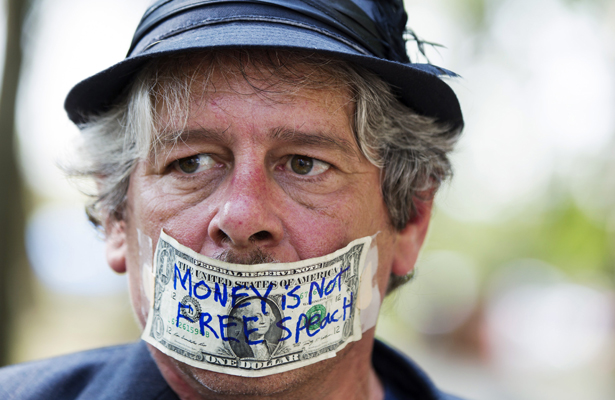
An Occupy Wall Street activist protests the influence of corporate funding in financing electoral campaigns. (Reuters/Lucas Jackson)
Writing Contest Finalist
We’re delighted to announce the winners of The Nation’s eighth annual Student Writing Contest. This year we asked students to answer this question in 800 words: It’s clear that the political system in the US isn’t working for many. If you had to pick one root cause underlying our broken politics, what would it be and why? We received close to 700 submissions from high school and college students in forty-two states. We chose one college and one high school winner and ten finalists total. The winners are Jim Nichols (no relation to The Nation’s John Nichols), an undergraduate at Georgia State University; and Julia Di, a senior at Richard Montgomery High School in Darnestown, Maryland, and Bryn Grunwald, a recent graduate of the Peak to Peak Charter in Boulder, Colorado, who were co-winners in the high school category. The three winners receive cash awards of $1,000 and the finalists $200 each. All receive Nation subscriptions. Read all the winning essays here. —The Editor
The contemporary American political arena has been marked by the intersection of crises that have threatened justice in a multitude of fronts – economic justice, social justice, environmental justice, etc. Elected officials and public servants alike are tasked with addressing these pressing and often extremely complex issues in the pursuit of solutions that encompass prosperity, security, and justice – in all of its forms – on behalf of the constituents to whom they owe their livelihood. This representative form of democracy is one of the great achievements – perhaps the greatest – of the American experiment. It provides the populace the opportunity to have an impact on the trajectory of their nations destiny based off of the principle of self-governance – the idea that political power is to lay in the hands of all of the people rather than being concentrated heavily under the authority of a small group of wealthy elites, a trend that has persisted throughout all of human history. This necessary dichotomy of a powerful citizenry and entrusted representatives designed to be directly accountable to that citizenry has been both the foundation and the engine of progress manifested in the promise of America.
However, the foundation has begun to come undone, as the idea of an elected official who faithfully acts upon the interests of the common man to whom he is accountable has been exchanged for the reality of the corrupt politician acting in subservience to any corporation that is willing to invest liberally into his/hers campaign coffers. This reality has been embraced with open arms by the Supreme Court of the United Statesevidenced by the 5-4 decision in Citizens United v. Federal Elections Commission, ruling that the First Amendment allows for unlimited corporate money to be funneled into the political system with little to no transparency. The effects of this unlimited and opaque influx of money into institutions of political power have been insidious and widespread, tearing at the foundation of the political system like an insurgency of termites. The Federal Elections Commission (FEC) estimated that approximately $7 billion was spent on the 2012 election altogether, with Super PACs, the notorious new form of political action committee that has risen to popularity post-Citizens United, reported to have spent approximately $950 million of that figure.
Popular
"swipe left below to view more authors"Swipe →
That is why unlimited money in politics is the root cause of the fractured political system within the United States and, by extension, responsible for the expansive nature of the crises we face. Corporate money has financed willful negligence on the part of elected officials in regard to these crises, instead favoring the advancement of their own agendas that too often are contrary to the interest of the general welfare. The voices of ordinary Americans are being drowned out by the gratuitous amounts of capital involved in the electoral process. This is evident in the analysis of the issues that plague millions of Americans on a daily basis.
For example, analyze the fallout of the United States economy that began in 2008, the depth of which still profoundly impacts tens of millions of Americans. This massive recession should have led to immediate and effective measures on the part of regulatory institutions to ensure some degree of economic stability and to prevent future economic crises. Instead, the 'Too Big To Fail' Banks have yet to be restructured and the establishment political class has avoided any form of prosecution or accountability on the part of the white-collared plutocrats who possess a large share of responsibility for the damage incurred. Millions lost their homes, their jobs, and their dignity while Wall Street received billions in Federal money for causing all of it.
This extends also to the devastation of our ecological system. Instead of heavily pursuing and investing in renewable and sustainable forms of energy in order to combat the very real climate change currently facing mankind, large oil and gas companies such as British Petroleum and Exxon Mobil have used their massive profits in order to pursue an agenda that further advances climate change, retaining their stranglehold over those that are supposed to be keeping them honest. Their political clout is directly related to the size of their checkbook and allows for them to push humanity further towards the border of extinction.
The combination of an economic system that allows for great levels of disparity and inequality amongst members of society and a political system where money is legally equivalent to political speech and effectively equivalent to political power has resulted in perpetual corporate dominance of the American political system. This fundamental reversal in position has transitioned political power from the calloused hands of the American worker into the hands of the Board of Directors of Goldman Sachs. Until this is changed, progress will be elusive on almost every front.


